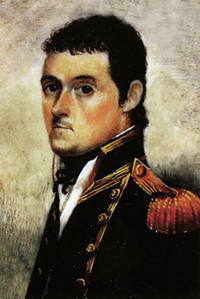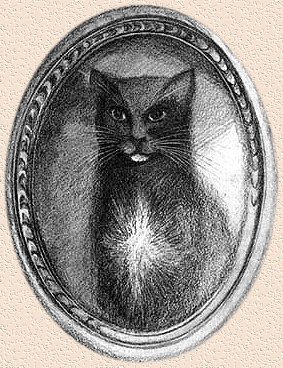By Rick Gay
 Three distinct nouns with one common denominator: Matthew Flinders, RN. Flinders was an 18th century navigator and cartographer for the Royal Navy, serving as midshipman under Capt. William Bligh where he learned much of his professional personality. Life as an 18th century officer on ships of the line was tough and required a callous exterior, which Flinders accomplished with ease. However, history (and the French) was cruel to Flinders, which ultimately allowed us to see his real personality. In 1801 Flinders, a Commander in charge of his own ship and newly married to Ann Chappell, set sail to what we now call, thanks to Flinders, Australia. In 1803, after successfully charting the southern coast of Australia, Flinders started his return trip back to England. Since his vessel was no longer seaworthy he planned to sail to Mauritius and seek passage back to Europe. However, upon arriving at Mauritius, he was arrested and spent the next six years captive.
Three distinct nouns with one common denominator: Matthew Flinders, RN. Flinders was an 18th century navigator and cartographer for the Royal Navy, serving as midshipman under Capt. William Bligh where he learned much of his professional personality. Life as an 18th century officer on ships of the line was tough and required a callous exterior, which Flinders accomplished with ease. However, history (and the French) was cruel to Flinders, which ultimately allowed us to see his real personality. In 1801 Flinders, a Commander in charge of his own ship and newly married to Ann Chappell, set sail to what we now call, thanks to Flinders, Australia. In 1803, after successfully charting the southern coast of Australia, Flinders started his return trip back to England. Since his vessel was no longer seaworthy he planned to sail to Mauritius and seek passage back to Europe. However, upon arriving at Mauritius, he was arrested and spent the next six years captive.
It is on Mauritius that we see the real Flinders. Flinders’ wasn’t known for keeping a happy ship, which is not surprising given the shipboard discipline of the day. However, in confinement he wrote poignant letters to his new wife from whom he would endure a nine-year separation. More revealing is his love for his cat, named Trim. Flinders wrote a book about the cat after Trim’s untimely death. This book shows Flinders real self – one who cares deeply. The insights he provides in his letters to Ann during his long confinement and the book about Trim indicate he was an open and genuine individual. Unfortunately Flinders died less than four years after his eventual return to England. This left Ann a widow after spending only three of their 13 years of marriage with her husband.
 One of the lessons we can take from Flinders’ life is to be genuine. We use the word genuine frequently, but do we really consider its meaning and how it applies to us? Genuine connotes that one actually possesses the qualities of character that they are reputed to have. How many times do we ask “How are you” without really caring? It’s part of the social exchange that lubricates society and opens the door to further conversation. However, if you really don’t care how someone is doing, don’t ask the question – you’re not being genuine. This is a simplistic example. In leadership, being genuine means to stop using – in essence acting – a leadership style of the organization you serve. Being genuine means opening yourself up to others – extending trust. This, in return, fosters trust.
One of the lessons we can take from Flinders’ life is to be genuine. We use the word genuine frequently, but do we really consider its meaning and how it applies to us? Genuine connotes that one actually possesses the qualities of character that they are reputed to have. How many times do we ask “How are you” without really caring? It’s part of the social exchange that lubricates society and opens the door to further conversation. However, if you really don’t care how someone is doing, don’t ask the question – you’re not being genuine. This is a simplistic example. In leadership, being genuine means to stop using – in essence acting – a leadership style of the organization you serve. Being genuine means opening yourself up to others – extending trust. This, in return, fosters trust.
How do we modify our behavior to improve our genuiness? I’ll let you in on a highly guarded secret – you do what you already know you should be doing: have a sense about yourself, be yourself, only engage in relationships that you truly care about, listen to others, and show appreciation.
Before you can be genuine you have to know yourself. How well do you know yourself? Have you been doing a job so long that you’ve adopted the persona of the job and lost who you are? What really matters to you? What are your weaknesses? What is your true motivation? Your priorities, values and religious beliefs? How do they fit together and compliment each other? How are they in conflict? How have you actually been living them out on a day to day basis?
Once you have a sense of yourself, you must then be yourself. This is easier written than implemented. In our society we are frequently influenced to be someone we are not. Conforming to societies rules is very important – it is the grease of civilization. However, don’t lose who you are to the rules under which you must live. Stand up for what you think is important. Intentionally and consistently work on goals that are aligned with your values. Socialize with like minded individuals. This does not mean to be narrow minded or limited to new experiences; inclusion is vital to your success. What I’m saying is that you should set the example by doing what is important to you – that is genuine.
The first two points – know yourself and be yourself – were internally focused. The last three are externally focused. First, you should only engage in relationships that you truly care about. People know when you aren’t invested in a relationship. You may have the job as leader, but do you really care about the people? Not just as tools or stepping stones, but as individuals who have personal values and goals like you? Adopt a mindset that enables you to value the relationships with the individuals around you, then build on common values and engage in partnering.
To grow your relationship with someone, you must listen to that person. No really, do you hear what I’m writing here? Listening is difficult because we are constantly thinking about what we want to say, not what the other person is saying. Listening is a learned skill and improved by practice. Stop what you are doing and look at the person, which disengages you from any other activities. Actively listen by paraphrasing back what the other person said to you – ask questions. Can you visualize what the other person is discussing? Observe non-verbal clues like body language and eye movement. Only when you completely understand the other person message should you take the time to consider your response.
The final point, to show appreciation, is well known and goes by many names like “reward and recognition” or “encouraging the heart”. We all like to know when we’ve done something that is appreciated by others. What leaders sometimes fail to recognize is that the act of recognizing the good performance should not overshadow the personal intent of showing the appreciation. Formal awards, cash awards or time off are nice, but if the leader doesn’t actually take the time to say thanks then the opportunity for growth and trust is lost. As pleasant as tangible benefits are, it’s more important to just take the time to personally thank someone on a one-to-one basis. It’s better to be timely and personal with your praise and thanks. Just taking the time to walk down the hall and directly say “thanks for your great report, it really helped us to solve that problem” is being genuine.
Photo credits:
(1) Picture retrieved from http://museum.wa.gov.au/exhibitions/voyages/about/flinders.html?iact=hc&vpx=908&vpy=332&dur=3584&hovh=239&hovw=160&tx=95&ty=149&sig=116842732519595248300&ei=6Qb_UNK-LOuJ0QH6v4GYBw&page=2&tbnh=142&tbnw=93&start=36&ndsp=47&ved=1t:429,r:61,s:0,i:273.
(2) Picture retrieved from http://www.purr-n-fur.org.uk/famous/trim.html.
